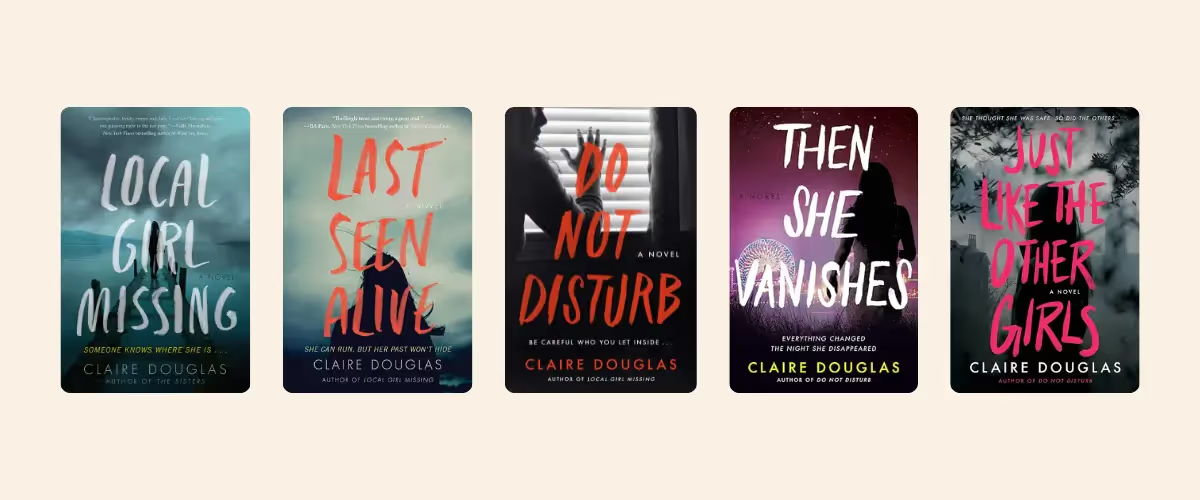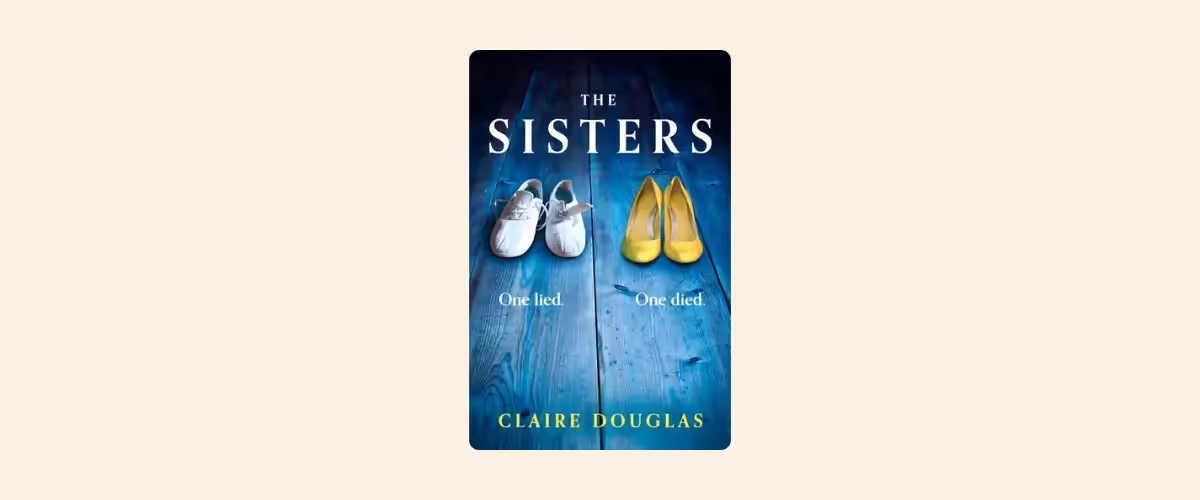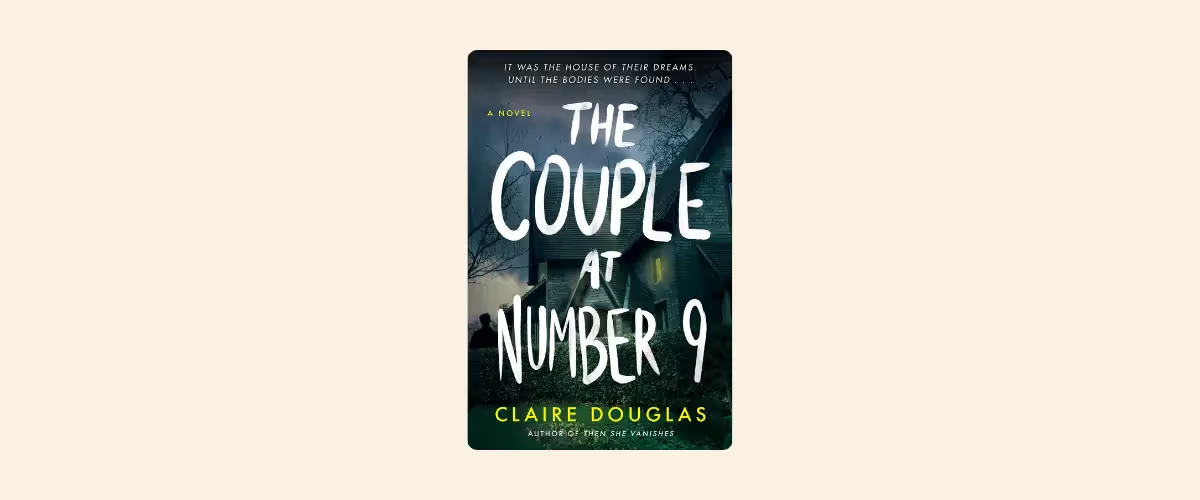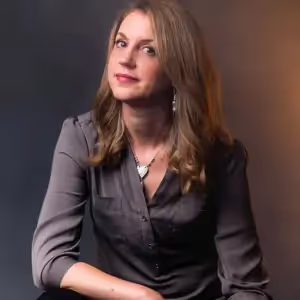Sometimes, writers start out writing one type of story but find themselves becoming interested in another. An overheard conversation on the bus, a dishwashing daydream, or even a ‘But why?’ question from a child can spark the thought of a new story. But what do you do when one idea is on a completely different plane from the other? Which do you dedicate your precious time to, crafting it into a fully formed novel, when their genres are shelves apart?
This is exactly what happened to bestselling author Claire Douglas at the very start of her writing career—and it all involved an entry into a writing competition.
Claire won the Marie Claire Debut Novel Award with her first novel, The Sisters, a psychological thriller that was followed by Local Girl Missing, Last Seen Alive, Do Not Disturb, Then She Vanishes, and Just Like the Other Girls. Her latest novel, The Couple at No. 9, was a Sunday Times top three bestseller and a Kindle number one. Members of The Novelry recently enjoyed an illuminating live workshop with Claire, where she discussed her writing process, the inspirations for her novels, and lots more.

In this article, Claire tells the story of her first steps in her writing career and how a writing competition left her facing a difficult decision on which genre path to take as an unpublished author. Claire discusses what happened, where it took her, how she’s come to know when she’s onto a winning story spark—and the ones she’s let go of in the process. Read on for the story of how Claire took a chance on which path to pursue—and how she got published!
Knowing what to write was tricky at the start
As a book-per-year author and currently writing my ninth thriller, I constantly have to come up with ideas I’m ready to run with. But how does an author know when that idea is strong enough to be turned into a 90,000-word novel?
I found this particularly tricky when I first started out. I was an unpublished author who had spent two years writing (and re-writing) a romcom about a pair of twins. It was very nearly ready to send out to literary agents.
But then, one day in 2013, as I was driving home from the school pick-up, I had a brainwave for a psychological thriller—also about twins. The first line and the subsequent paragraph popped into my head, fully formed, and I was terrified I’d forget it before I got home.
I rushed into the house to capture the first chapter and I realised, as I furiously typed, that I felt more excited about this dark, twisted story than the full-length romantic comedy novel I’d spent two years working on.
I realised, as I furiously typed, that I felt more excited about this dark, twisted story than the full-length novel romantic comedy novel I’d spent two years working on.
—Claire Douglas
An opportunity from a writing competition
Then came decision time—my friend sent me details of a writing competition Marie Claire magazine was holding in conjunction with HarperCollins. The prize was an introduction to a literary agent and a publishing contract—a dream-come-true prize for me and something I had been wanting for so many years. (I had many rejection letters in my desk drawer at home to prove it.)
The competition required the first three chapters of a contemporary novel with a two-page synopsis. I had my full manuscript of the romcom ready to go, polished and re-written to within an inch of its life, but now I had this other idea—the thriller that I had only just started writing. And I didn’t know which one to send.
I told myself I should send the romcom because I had finished it, and because I had only just started writing this other story, which still felt messy and incomplete.
But the romcom didn’t excite me in the same way my new idea did. So, I decided to swiftly write the next two chapters of the psychological thriller and hone the synopsis—and I sent that instead, just in time to meet the deadline.
The results changed the game
I didn’t hear back from the competition for several months and simply forgot about it. After all, I’d entered numerous writing competitions in the past and had never gotten anywhere with them. So, when they contacted me and told me I had won, I couldn’t believe it.
The thriller idea I thought of on that afternoon school run, the one I hurried into the writing contest, became The Sisters. It was my debut novel and my path into publishing.

I’ll never know what would have happened if I had sent in my other novel instead.
But, of course, there is always the dreaded fear that I’ll never think of another idea again.
I didn’t hear back from the competition for several months and simply forgot about it. After all, I’d entered numerous writing competitions in the past and had never gotten anywhere with them. So, when they contacted me and told me I had won, I couldn’t believe it.
—Claire Douglas
All ideas are worth saving
My best piece of advice would be to make a note every time you come up with an idea—either in a notebook or, as I do, in a Word file.
When an idea strikes, I always write it down so that I don’t forget it. Then, I can mull it over in more detail when the time comes to think about what I’m going to write next. Some ideas might only be strong enough for a short story like ‘The Text.’ Others I’ve discounted because they might have been too similar to other published books, or they just didn’t feel exciting when I returned to them—not in the way The Sisters did.
The inspiration for my other books
I get most of my ideas from reading crime pieces in newspapers or magazines. I was a journalist before I became a writer, mostly covering local stories that could be turned into true-life features for women’s magazines, and this experience has sparked many of my ideas.
My latest book, The Couple at No. 9, is about Saffy and Tom, who find two bodies buried in their garden while building a kitchen extension. This was inspired by a story I covered about a young couple in Winchester who were excavating their basement to install a kitchen when they found a skeleton.
That skeleton turned out to be hundreds of years old. Still, it triggered the idea for The Couple at No. 9. I let my imagination take me further, adding another layer: what if the house Saffy and Tom were renovating actually used to belong to her grandmother, Rose? And what if the murders had taken place 30 years before, when Rose lived there? And what if Rose couldn’t remember much about that time because she was in a nursing home with dementia?

How I test my ideas
For me, the four main ingredients I need before I can start believing my idea is ‘The One’ are:
- What is the hook?
- Who are the characters?
- What is the twist?
- Where is it set?
I don’t really plan my books—I’d definitely be in the ‘pantser’ category! But as long as I have intensively thought about the four points above, I find it’s enough to carry me through the 90–100k words needed to complete the novel.
If the idea still excites me after I’ve thought about all these elements, then I’ll run with it. There is only one of my books—an early one—where I felt I didn’t listen to what my instincts were telling me, and even though the novel was published, I was distracted while writing it because another, better idea (that went on to become the next book) kept pushing into my subconscious, and I couldn’t wait to write that one. As a result, I wasn’t quite as passionate about what I was writing, and it was more of a chore to get down the words.
{{blog-banner-6="/blog-banners"}}
If you have a few different ideas and you’re not sure which one to run with, think about whether the idea interests you enough to sit down every day and write it and whether there are things you find exciting and enjoyable about the characters, setting, hook, or plot.
If you’re thinking of trying out a writing competition to flex your literary muscles and show some of your work to the light, you can read our comprehensive blog post listing a whole plethora of brilliant prizes and awards that are available for writers to enter. Above all, writing is something to be enjoyed—and chances are there to be taken. Be brave, and have fun!
Welcome home, writers. Join us on the world’s best creative writing courses to create, write, and complete your book. Sign up and start today.



.avif)
.avif)
.avif)
.avif)